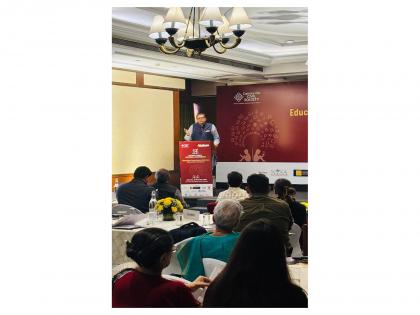12th School Choice National Conference Highlights a New Vision for Rapid Education Reform through Policy Innovation and Choice
By ANI | Updated: November 24, 2025 15:45 IST2025-11-24T15:43:33+5:302025-11-24T15:45:03+5:30
VMPL New Delhi [India], November 24: The 12th School Choice National Conference (SCNC 2025) was held at the ...

12th School Choice National Conference Highlights a New Vision for Rapid Education Reform through Policy Innovation and Choice
VMPL
New Delhi [India], November 24: The 12th School Choice National Conference (SCNC 2025) was held at the India Habitat Centre, New Delhi, bringing together over 150 participants including policymakers, education leaders, practitioners, researchers, and reformers. Returning in its in-person format after 6 years, the conference served as a unique national platform to deliberate on education governance reforms, enquiry-based learning, assessment transformation, and student-centred financing.
Key Highlights from the Conference
Baijyant "Jay" Panda, Member of Parliament
Delivering the keynote address, he underscored the central role of education governance in shaping India's future."Education reform is the key to India's future. Learning outcomes must be at the heart of education policy, and India should explore systemic reforms such as Direct Benefit Transfers (DBT) in education." He emphasized that student-centred financing models enhance transparency and provide real choice to families.
Ashish Sood, Minister of Education, Delhi
Speaking about the need for a shift in teaching and institutional governance, he said: "Our education system must move from teaching children what to think to teaching them how to think". Resources must follow the child, not just institutionsFund Students, Not Schools reflects this vision. He highlighted the importance of modernizing regulatory frameworks to support innovation, accountability, and equity.
Vedita Reddy, IAS, Director of School Education, Government of Delhi
She stated: "Children and teachers must be at the centre of education reform. Safe, inclusive, curiosity-driven environments determine the real quality of learning."
Dr Sanyam Bharadwaj, Controller of Examinations, CBSE
He emphasized that assessment must drive real changes in classroom practice: "When examinations reward reasoning, application, and analysis, classroom learning transforms automatically." He detailed CBSE's shift toward competency-based assessments from 2025-26 and the role of PARAKH in setting national benchmarks.
Asmita Satyarthi, CEO, Satyarthi Movement for Global Compassion
She highlighted the importance of compassion and safety in education:"Every child deserves a learning environment that is safe, dignified, and rooted in curiosity. Compassion must be integral to how we design our education system."
Gurcharan Das, Author and Public Intellectual
He noted that India's progress depends on nurturing thinking citizens: "India will be future-ready only when we encourage children to ask questions, experiment, and think independently."
Key Themes Discussed
* Enquiry-Based Learning (EBL): Moving from rote memorisation to curiosity-driven learning.
* Education Governance Reforms: Simplifying regulations, strengthening accountability, and enabling innovation.
* Fund Students, Not Schools: Exploring DBT in Education to ensure resources follow the child.
* Assessment Reforms: Competency-based evaluations and national benchmarks under PARAKH.
* Learning Outcomes: Positioning outcomes as the central indicator of quality.
CCS Perspective: Dr Amit Chandra, CEO of the Centre for Civil Society, said: "For India to build a learning-first system, reforms must align across policy, assessments, and governance. Putting the student at the centre is the foundation of real transformation."
Conference Snapshot
* 150+ participants | 20+ national speakers and experts
* Multiple spotlight dialogues and panel sessions
* Discussions across governance, financing, learning, and innovation
Conclusion: SCNC 2025 highlighted that India's education system is at a pivotal moment. To build a future-ready system, India must embrace reforms rooted in learning outcomes, transparency, autonomy, and student-centred financing. The conference reaffirmed that governance reform is essential for shaping a Viksit Bharat by 2047. The Centre for Civil Society will continue working with governments, practitioners, and civil society partners to advance these reforms.
About Centre for Civil Society
Centre for Civil Society (CCS), founded in 1997 in New Delhi, works to promote choice for individuals, competition in market and accountability of institutions through evidence-based research, outreach, and educational programs. CCS works in the area of school education, urban livelihoods, and governance.
(ADVERTORIAL DISCLAIMER: The above press release has been provided by VMPL.will not be responsible in any way for the content of the same.)
Disclaimer: This post has been auto-published from an agency feed without any modifications to the text and has not been reviewed by an editor
Open in app